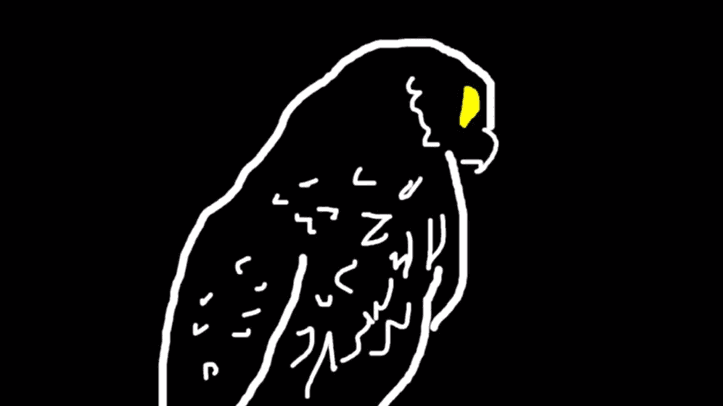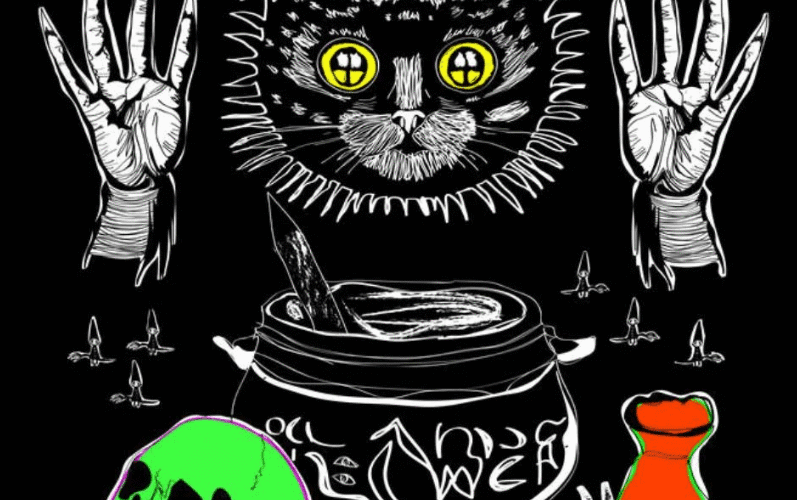Ubu Imperator is a neo-krautrock band hailing from Munich, formed in early 2022. The trio consists of guitarist Simon Bartenschlager, synthesist Raphael Höps, and drummer Daniel Pizarro. I recently saw them live in Limerick, where they were promoting their debut vinyl release, Ave UBU. Despite the absence of Bartenschlager at the concert, their performance left a strong impression on me — enough to pick up the vinyl at the merch stand right after the show.

Here’s a track-by-track breakdown of Ave UBU:
Ubus Garden
This opening track feels like a journey into the roots of avant-garde electronic music. It strikes me as a tribute to Karlheinz Stockhausen, the visionary German composer who helped pioneer both electronic and experimental sound. “Ubu’s Garden” plays like a modern Musique Concrète piece — reminiscent of Pierre Schaeffer — but rather than using manipulated tape recordings, Ubu Imperator utilizes modular synthesis, textural electronics, and even modulated analog drums. Part of the rhythmic content seems to stem from sonification — the transformation of data into sound — which contributes to the piece’s layered, almost algorithmic feel.
There’s a strong sense of abstraction in the structure: the track doesn’t aim for melody or linear progression, but instead focuses on atmosphere and experimentation. Sine waves collide with crackling drones and synthetic pulses, creating a piece that feels more like a sonic sculpture than a traditional composition. It’s an intriguing and daring start to the EP — a clear statement of intent. This isn’t retro krautrock revivalism — this is progressive noise, informed by electronic music history but pushing into new, uncharted territory.
Randale
“Randale” kicks off with a surprisingly clean guitar line and a solid drum groove — alternating between a driving 4/4 and a tighter 2/2 rhythm — evoking the energy of an indie rock or pop band. But just as the listener settles into that familiarity, a bold FM synth patch slams into the mix, shifting the track into more intense, futuristic terrain.
Soon, a second synthesizer enters, more melodic in tone. This section feels like a nod to Kraftwerk, but with a more organic and raw texture — less polished and more alive. When the vocals arrive, the melodic synth drops out, and the focus shifts. The singer’s delivery injects the piece with a punk attitude, adding grit and tension to the electronic undercurrent.
As the track unfolds, it becomes increasingly progressive, evolving through layers of synth work and subtle shifts in tonal character. The track moves through various atmospheres — from punchy and kinetic to airy and expansive, at moments echoing the ambient landscapes of Tangerine Dream. The contrast is striking: tight rhythms dissolve into abstract passages, and then reform into something new. There’s a lot happening in “Randale”, but it never feels disjointed. Instead, it flows like a miniature suite, full of unexpected turns and stylistic contrasts. It’s a standout on the EP — adventurous, layered, and full of character.

Greiser Phoenix
“Greiser Phoenix” presents a complete shift in vibe from the previous track, diving headfirst into darker, heavier territory. It opens with a powerful synth bassline, locked in tight with a clean, cutting guitar and a frenetic drum section. There’s an energy here that evokes early Black Sabbath — not in tone, but in mood and weight. The sonification is modern, synthetic, yet it delivers that same raw heaviness.
As the track progresses, a microtonal sequencer enters the mix. It doesn’t quite veer into granular synthesis territory, but it brings a spectral instability — subtly shifting the tonal center and pushing the listener into more unsettled terrain. The atmosphere grows darker still, flirting with doom aesthetics, especially as the guitarist begins to layer in atonal riffs reminiscent of Slayer, but with a very different, almost clinical texture. The drummer is relentless here, pushing the track forward with heavy, deliberate strikes.
There’s a lot of dissonance and pressure — and then, a brief moment of relief. A sudden emergence of light filters in through a layer of melodic synths, giving the track a momentary lift. But that brightness is fleeting. The song quickly evolves again — this time into a funkier, more conceptual section, bursting with a kind of unexpected happiness and freshness that recalls Primal Scream in their more psychedelic moments.The result is another highly progressive piece, both in terms of structure and sonification. It’s a journey through opposing emotional states — tension and release, darkness and brightness — all stitched together through experimental textures and dynamic shifts. Another standout track that showcases Ubu Imperator’s versatility and fearlessness.

Kardinalkardinal
“Kardinalkardinal” opens with a reversed cymbal swell and wind-like noise, setting a surreal, slightly disorienting tone. The guitar takes centre stage early on, offering a funky, driving rhythm, while the drums maintain a steady yet expressive groove. Soon, the kick drum asserts itself more prominently, anchoring the track with a pulsing, hypnotic energy. It feels firmly rooted in krautrock, but filtered through a funk-inflected lens — sharp, rhythmic guitar work and spacious, tight drumming that propels the track forward.
What really stands out is how each band member seems to be operating in their own sonic space, yet the track never collapses into disorder. Instead, it maintains a tension between chaos and cohesion, revealing a deep musical dialogue among the trio. The arrangement feels both loose and precise — a paradox that’s rare and compelling. During the chorus, the track coalesces into a more melodic and unified section, giving a clear sense of direction amid the swirling, fragmented textures.
There’s a strong feeling that this track was born out of a jam session, perhaps even improvised in part — you can hear the spontaneity, the push and pull between ideas, and the reactive energy in the playing. As it progresses, the piece dives into moments that feel almost Zappa-esque — jagged changes, angular funk rhythms, and bursts of experimental noise. At the same time, touches of Tangerine Dream-style electronic atmospheres give it a wider emotional range and a psychedelic dimension.Another standout, “Kardinalkardinal” balances compositional form with improvisational fire. It’s unpredictable, richly textured, and — like much of the EP — deeply alive.
Gogol
“Gogol” opens with a melodic guitar line soaked in long-delay, playing in syncopation with the drummer’s closed hi-hats, creating a hypnotic, interlocked groove. Soon after, a deep synth bass emerges, anchoring the track with low-end resonance, followed by the return of oscillating melodic synths that shimmer in and out of focus. This track leans toward a more chill, introspective tone, especially compared to the heavier pieces that precede it.
Unlike the other tracks, “Gogol” feels more guitar-centric, and it’s easy to imagine this one being led — or perhaps even conceived — by Simon Bartenschlager. The phrasing of the guitar feels intentional, expressive, and central to the emotional shape of the piece.
But despite its chilled introduction, “Gogol” doesn’t stay in one place for long. The track moves fluidly through a series of contrasting atmospheres — echoing moments of Can’s fluid improvisation, then swerving into the aggressive energy of Rage Against the Machine, and even brushing up against doom metal weight and tension. These dramatic shifts are executed with purpose, not just for shock value, and they lend the track a sense of narrative and emotional depth.
There are passages here that feel intensely emotive, with the textures and playing style creating a kind of internal dialogue. It’s another example of Ubu Imperator’s ability to craft pieces that are both exploratory and deeply felt, mixing genres and moods without losing cohesion.
A strong closer to the EP, “Gogol” reinforces the band’s vision: genre-agnostic, emotionally resonant, and unafraid to take risks.

Schwein
“Schwein” begins with an almost indifferent, confrontational attitude — a slacker-punk posture that’s immediately unsettling. The rhythmic section is fluid but uneasy, and the harmonic tension between distorted guitar and abrasive synthesis creates a feeling that something is on the verge of collapse. It’s a track with a strong sense of attitude, as if it’s daring the listener to expect disaster — and then slowly delivering on that promise.
As the song progresses, it veers into electroacoustic territory, layering in samples and harsher textures until it transforms into something intense and unrelenting — sitting somewhere between a rave and doom metal. There’s a physicality to the sound here, like the band is building toward a personal Armageddon. It wouldn’t be surprising if this piece was conceived with imagery like The Four Horsemen in mind — it has that apocalyptic weight.
But Ubu Imperator’s gift for contrast is on display once again. Amid all the tension and destruction, there are brief, shimmering moments of light — calm after the storm — but they’re fleeting, barely long enough to catch your breath before the chaos resumes.“Schwein” is a fantastically executed finale, closing the EP on a note of cathartic release. It distills the band’s core strengths: fearless genre-blending, rich textural layering, and an ability to create emotional resonance through sonic experimentation.
Caissa
“Caissa” stands out for its more clearly defined structure, which gives it a kind of structured narrative arc. There’s even space for the guitarist to step forward with a lyrical solo, unexpectedly smooth and expressive — almost in the style of Carlos Santana — offering a moment of warmth amid the chaos.
As “Caissa” evolves, it moves between extremes: moments of punk detachment, electronic rave energy, and even passages of beautiful harmonic resolution. It never stays in one mode for long, but the transitions are deliberate and purposeful. Toward the end, it returns briefly to that anarchic, post-everything vibe — punk by spirit, but reshaped through digital and analog textures. Of all the tracks on Ave UBU, “Schwein” feels closest to a pop structure, with its clearer divisions and emotive hooks. It might be the most accessible piece on the EP — and yet it still maintains the band’s signature complexity, emotional depth, and sonic contrast. Another fabulously executed track that rounds off the record with style.

Conclusion
Ave UBU is a fantastic debut — rich in diversity, full of bold ideas, and surprisingly accessible despite its complexity. What makes it special is how Ubu Imperator manage to blend experimental textures and structural unpredictability with a kind of subtle listenability that sneaks up on you. Even at its wildest, the music never feels alienating — in fact, at times it flirts with being radio-friendly, without ever compromising its edge.
That’s what I love most about this album: you’re hearing truly strange, creative, genre-defying music — and often, you don’t even realize how far out it’s gone until you take a step back. It’s the kind of record that rewards repeated listening, and each time through, I’ve found new layers, new emotions, new moments of brilliance.
If this is just the beginning, I’m truly excited to see what Ubu Imperator comes up with next. A bold and promising statement from a band unafraid to explore the edges of sound.




















